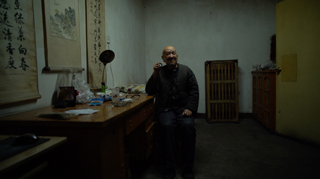Dead Souls
 FRANCE, SWITZERLAND / 2018 / Chinese / Color / DCP / 495 min
FRANCE, SWITZERLAND / 2018 / Chinese / Color / DCP / 495 min
Director, Photography: Wang Bing
Editing: Catherine Rascon
Sound: Raphaël Girardot, Adrien Kessler
Producers: Serge Lalou, Camille Laemlé, Louise Prince, Wang Bing
Production Companies: Les Films D’Ici, Cs Productions
World Sales: Doc&Film International
About the many who were purged in the Chinese Communist Party’s late 1950’s Anti-Rightist Campaign and sent to a re-education camp in the Gobi Desert. Countless of these died of starvation in this harsh environment, barely fed and forced to perform hard labor. In over eight hours of testimony, Wang Bing pursues the themes that he first depicted in Fengming, a Chinese Memoir and his first non-documentary feature The Ditch. Through the stories of brutal experiences told by survivors and images of human bones dispersed throughout the remains of the detention facility, one can hear the screams of the souls of those who died and were forgotten.
[Director’s Statement] Like myself, many people knew about whom the Chinese regime called the “Rightists.” We knew that there had been a repression, that a great number of persons had been sent to reeducation camps. But we didn’t know anything about the reality of the camps and life there. We were unaware of the magnitude of the purges, the countless deaths, and the national scale of the anti-rightist movement.
Even though a chronological reconstitution did seem more logical and easier to understand, it wouldn’t have placed as much value on the testimonies, which for me was absolutely essential. What do all these people have in common? All lived through horrible, unimaginable things. And all had in common the fact that they survived. Their stories are thus very personal. Their focus is on describing the camps and on those who died there, but above all they reveal what each one of them had to do to stay alive.
I understood that it was the gap between the words of the survivors and the silence of the dead that would be the subject of Dead Souls.
Regarding inquiring into the other side, I was able to meet with a guard. He appears towards the end of the film. It is through him that we discover a photo of the camp. We have to remember that the leaders of the Party were already around forty years old in 1950. They are all deceased. That’s the reason they are absent from the film.
Born in Shaanxi, a province in central China in 1967, Wang Bing first studied photography at the Lu Xun Academy of Fine Art before studying cinematography at Beijing Film Academy. He began his career as an independent filmmaker in 1999. His directorial debut, Tie Xi Qu: West of the Tracks, was released in 2003 (Grand Prize at YIDFF 2003). He has since made 11 documentaries, many of which have been released in theaters. Wang has been a leading documentary filmmaker of the burgeoning independent documentary scene in China for the almost two decades. Acclaimed by critics and recognized as one of the most important Chinese artists and filmmakers of his time, his work has garnered awards and international praise at major film festivals. His recent Japanese releases are the acclaimed documentaries Fengming: A Chinese Memoir (2007, Grand Prize at YIDFF 2007), Three Sisters (2012), Til Madness Do Us Part (2013), Bitter Money (2016).
